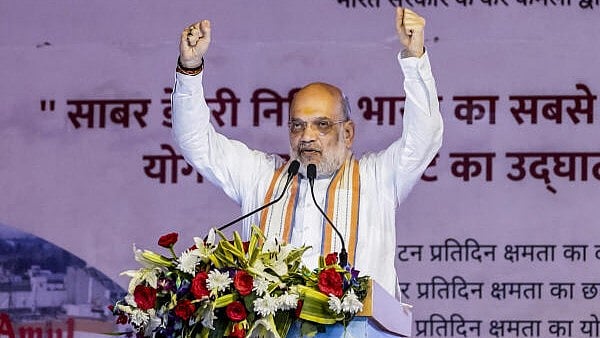
Union Home Minister Amit Shah.
Credit: PTI
Kurukshetra: Union Home Minister Amit Shah on Friday said the enactment of three new criminal laws is the biggest reform the country has witnessed in the 21st century.
He asserted that the new laws will make the process of justice delivery simpler and time bound and after 2026, an FIR will be disposed of in three years on an average.
Shah stressed that the new laws -- the Bharatiya Nyaya Sanhita (BNS), the Bharatiya Nagarik Suraksha Sanhita (BNSS) and the Bharatiya Sakshya Adhiniyam (BSA) -- framed by the BJP-led Centre are going to transform the criminal-justice system in the country.
The BNS, the BNSS and the BSA replaced the colonial-era Indian Penal Code (IPC), the Code of Criminal Procedure (CrPC) and the Indian Evidence Act, respectively. The new laws came into effect on July 1, 2024.
Shah was addressing a gathering after inaugurating a week-long exhibition on the three new criminal laws in Haryana's Kurukshetra. He also digitally inaugurated and laid the foundation stone for development projects worth approximately Rs 825 crore for Haryana.
The home minister said there is a perception among people that if they go to a police station, they will not get justice for years.
"I can say it with confidence that after 2026, a First Information Report (FIR) will be disposed of in three years on an average and justice will be ensured," he said.
Shah said Prime Minister Narendra Modi has introduced reforms in many sectors but the enactment of the three criminal laws is the biggest reform the country has seen in the 21st century.
Modi had said "citizen first, dignity first, justice first" and the laws were framed on the basis of that principle, he said.
In one year since the implementation of the new laws, in 53 per cent criminal cases lodged across the country, chargesheets were filed within 60 days, in 65 per cent cases, they were filed within 90 days, while in Haryana, 71 per cent chargesheets were filed within 60 days and 83 per cent within 90 days, the home minister said.
The conviction rate in Haryana doubled to 80 per cent after the implementation of the new criminal laws, he added.
"I congratulate the Haryana government that while I had talked about achieving a 75-per cent conviction rate, you have made it 80 per cent," Shah said.
He asserted that under the new laws, justice will be ensured within three years and there will be no "tareekh pe tareekh" (repeated adjournments in courts).
The home minister, who piloted the laws, said they would give priority to providing justice, unlike the colonial-era laws that gave primacy to penal action.
The purpose of the laws framed by the British was to maintain their rule in India and not ensuring the welfare of the people of the country, he said.
"We gained independence on August 15, 1947, but did not get rid of the laws framed by the British in the British Parliament in the 1860s," he said.
Touching upon the new laws, Shah said instead of a "stick" and "third degree", police today work on data and scientific evidence.
Through these new laws, police, jail, the judiciary, the prosecution and forensics have been connected online, he said.
Shah also pointed out that thanks to E-FIRs and Zero FIRs, women need not visit police stations anymore to get a complaint lodged.
Forensic examination has been made mandatory in every crime attracting a punishment of seven years of imprisonment or more, he added.
The home minister said new challenges like mob lynching, terrorism, organised crime and digital crime have emerged.
There is a provision in the new laws for a trial in absentia for an accused who has fled the country, he noted.
Shah said nearly 14.8 lakh police personnel, 42,000 prison staff, 19,000 judicial officers and more than 11,000 public prosecutors have been sensitised about the new laws.
On the occasion, the senior Bharatiya Janata Party (BJP) leader also pointed out that the Modi government has brought Goods and Services Tax (GST) reforms ahead of Diwali.
The prime minister has asked people to buy "swadeshi" items, he said, adding that Mahatma Gandhi had given this mantra of "swadeshi" during the freedom struggle.
Modi's "swadeshi" push will pave the way for a "Great India" by 2047, Shah said.
If 140 crore Indians buy only those products that are made here, it will become the world's biggest bazaar and the country's economy will grow further, he said.
By 2047, India should occupy the top spot in each sphere in the world, the home minister said, adding that the path on this journey passes through "swadeshi" and "atmanirbharta" (self-reliance).
There was also a live demonstration simulating a crime-scene investigation under the new laws at the exhibition here.
"If you have been at the exhibition, you would know that a murder accused was put behind bars within 112 days," Shah said.
The exhibition showcases the achievements of the new laws and highlights the roles of various departments, divided into 10 thematic sections.
It also explains the direct benefits of the new legal framework, including speedy trials, the use of modern technology and quicker case resolutions.
On the occasion, Shah also said the people of Haryana have given their mandate to the BJP for a third consecutive term and no stone has been left unturned for the state's development.